Research & Innovations
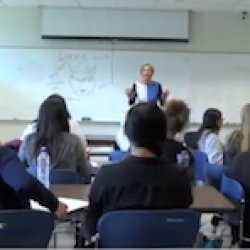
Curriculum Redesign
The Speech, Language and Hearing Sciences (SLHS) department was awarded a grant from the Teagle Foundation to conduct an undergraduate curriculum redesign. The curricular innovations were developed in response to unprecedented growth in the undergraduate program over the last two years and with the aim to provide students with the support they need for college and post-college success, particularly for those from first-generation, low-income, and minority backgrounds. The goals for the SLHS department curriculum redesign were threefold. The first was to systematically support students’ fulfillment of the undergraduate requirements consistent with American Speech-Language-Hearing Association (ASHA) accreditation standards so that students may be candidates for graduate studies in Communicative Sciences and Disorders. The second was to broaden students’ career and advanced degree options beyond the Communicative Sciences and Disorders field. The third was to provide stronger academic support to students, especially students who are first-generation college attendees or who are from under-represented backgrounds. As a part of the curriculum redesign, we transitioned our undergraduate degree from a Bachelor of Arts to a Bachelor of Science in Communicative Disorders. And in 2020, we transitioned to a Bachelor of Science in Speech, Language and Hearing Sciences.
In 2020, we also transitioned to a Master of Science in Speech, Language and Hearing Sciences. At that same time, we initiated our course renaming project, which is ongoing. This project entails the removal of stigmatizing words from our course names, and updating the vocabulary to better reflect our department's Mission and Vision.
For more information about SLHS Curriculum Redesign, please contact Dr. Laura Epstein at lepstein@sfsu.edu.
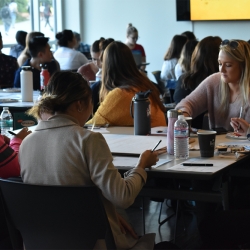
Interprofessional Education and Interprofessional Practice in SLHS
Interprofessional Education (IPE) and Interprofessional Practice (IPP) are essentially means to bring interdisciplinary perspectives together in order to improve practice in health, education and social service disciplines so that people who are the center of services are provided the most optimal care. Through IPE, professionals are prepared to provide IPP that is coordinated and creates access to integrated services and resources from each discipline. IPP is the desired outcome for individuals and their family members to maximize positive outcomes and access to resources. IPP requires that professionals have experienced and mastered interprofessional competencies. Although teamwork, interdisciplinary collaboration and coordination of care have been standards of care for decades, IPP breaks down silos and maximizes the connectivity of disciplines to coordinate a seamless support for families and individuals in health, education, and social service systems of care. The ideal outcomes may not always be achievable in each case, yet the continued focus is to strive for maximum coordination and linkage in each situation.
In the Department of Speech, Language and Hearing Sciences at San Francisco State University, IPE experiences for undergraduate and graduate students are centered on including perspectives of individuals with disabilities and their family members in determination of clinical services (https://slhs.sfsu.edu/ipe). These principles are founded on best practice in health, social services and education professions that focus on including individuals and families to have a central voice in determining and designing their support programs. In addition, the field of Disability Studies informs practice in SLHS to focus on societal inclusion of people with disabilities. Each of the above areas serve to enhance and expand the practice of Interprofessional Education through the lens of Person-Centered Practice and the concepts of Disability Studies. The accreditation standards for Speech, Language and Hearing Sciences by the American Speech, Language and Hearing Association (ASHA) and the affiliated Council of Academic Accreditation (CAA) require that speech-language pathologists and audiologists are prepared in Interprofessional Education (IPE) to provide Interprofessional Practice (IPP) upon graduation.
Instructionally Related Activities (IRA) funding at San Francisco State University has supported the development of IPE within the SLHS Department for two consecutive years. In the first year, 2018—2019, IRA funding enabled a student leadership team, members of NSSLHA in SLHS and faculty advisors, to host the first IPE forum attended by 30 undergraduate and graduate students representing all departments in the GCOE. In the second year, 2019-2020, two student assistants from the prior IPE NSSLHA student leadership team were hired with IRA funds to develop an online IPE Guide in the form of a website to support SLHS students and faculty to expand the IPE initiative in SLHS, the GCOE and throughout the university.
Currently, IPE initiatives are carried out both fall and spring semesters. In the fall semester, the focus of SLHS IPE is on early childhood, through a collaboration with Early Childhood Special Education. In the spring semester, the focus is on adults with swallowing and feeding disorders, in collaboration with the Dietitics program.
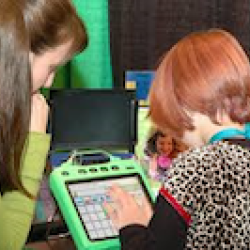
Training & Research on Augmentative and Alternative Communication (AAC)
An estimated 12% of preschoolers and 5% of school-aged children have significant speech impairments by the time they enter first grade. In California alone, approximately 130,000 children present with developmental disabilities that affect their ability to acquire and use speech functionally or develop adequate language skills. Since language is essential for social and academic participation, children with significant communication impairments are at high risk for social isolation and academic underachievement. For these children, the introduction of Augmentative and Alternative Communication (AAC) tools is critical to support their communication development, language acquisition and fuller academic, social and vocational participation. AAC systems are multimodal, and can range from unaided modes of communication such as gestures and manual signs to aided modes such as words or pictures/symbols mounted on communication books or boards, as well as high tech speech generating devices and mobile tablet technologies.
However, the provision of AAC is only a first step. It is well known that even with the provision of AAC, children with developmental disabilities experience persistent difficulties in their acquisition of language, in particular in relation to the production of grammatically complete utterances in face-to-face conversations. Effective interventions are needed to maximize the use of these tools and support communication and language development in these children.
The SLHS department at SF State is committed to training SLPs with a strong background in AAC assessment and intervention. A number of opportunities are available to that end, ranging from a post-bac certificate in AAC, a state of the art AAC lab, a number of clinical opportunities in AAC across the age span (i.e., toddler through older adults, ) and in different service delivery settings, as well as participation in a number of ongoing training and research grants.
For more information about AAC training and research, contact Dr. Gloria Soto at gsoto@sfsu.edu or Dr. Nancy Robinson at nancyr@sfsu.edu, or visit https://aac.sfsu.edu/.

Addressing California's Audiology Shortage Issue
The National Institute of Aging has estimated that by 2020, the need for audiologists to serve the older population will increase by 50 percent. US Department of Labor projects the audiologist employment to grow at a rate of 29 percent from 2014 to 2024, four times the average rate for all occupations. According to California Academy of Audiology data, California needs 750 additional audiologists by 2030 to meet the state’s demand for audiology services. On September 9, 2016, the governor of California, Jerry Brown, signed AB 2317 into law. This bill will now allow the California State University system to offer Doctor of Audiology (AuD) programs. This is a major accomplishment in the quest to help bring much needed audiology training programs to the state. This bill was spearheaded by the SF State SLHS department faculty (with Dr. Marcia Raggio taking the lead) and supported by the faculty and administrations at a number of CSU campuses.
Dr. Raggio has also conducted research in collaboration with the University of California at San Francisco (UCSF) on the cortical contributions to speech perception in noise in individuals with normal hearing and hearing impairment. The focus of Dr. Raggio's research has been on the representation of peripheral electrical stimulation of the auditory nerve, in the form of a cochlear implant, in the auditory cortex in an animal model. These were the first studies of their kind that looked at the central nervous system consequences of electrical stimulation in trained and untrained animals. She and her colleagues also looked at these representations in short and long-term deafness, as well as in the implantation of neonatal vs. adult implant recipients. Since then, numerous studies have been performed throughout the world that reference this early work. We know now about the profound changes that take place in the organization of the auditory cortex following this now widely used clinical treatment of deafness in adults and children. This work, performed by Dr. Raggio and her UCSF colleagues, has been cited over 350 times.
For more information about the AuD initiative and Dr. Raggio's research, please contact Dr. Raggio at mraggio@sfsu.edu.
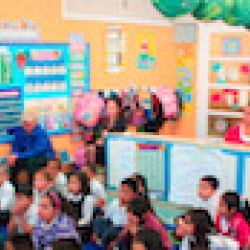
Serving Children in Culturally and Linguistically Diverse School Settings
Bayshore Elementary School District (BESD) is a culturally and linguistically diverse school district at the border between San Francisco City and County and Daly City. Through a partnership between BESD and Speech, Language and Hearing Sciences at SF State that was established from 2016-2023, graduate and undergraduate students in Speech, Language and Hearing Sciences received clinical education in this diverse, authentic school setting, focusing on contextualized, curriculum-based intervention. The district consists of an elementary and middle school blended into one site, as well as a separate early childhood education site called Bayshore Child Care Services.
For more information about this project, please contact the principal investigator and project lead, Dr. Laura Epstein at lepstein@sfsu.edu.
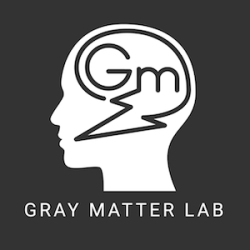
Gray Matter Lab
The Gray Matter Lab's vision is that bilingual and multilingual populations with aphasia will receive the highest quality of therapy in order to increase communicative effectiveness and quality of life experiences. Current research in the lab is focused on the following: 1) the exploration and evaluation of language control in the context of lexical access impairment in bilingual adults with aphasia; 2) treatment studies that investigate and compare the training effects of linguistic control treatments and non-linguistic control treatments on language control impairment in bilingual aphasia; and 3) developing a multi-lingual website that provides free language treatment materials for speech pathologists (in collaboration with Penn State and Boston University).
For more information contact the principal investigator Dr. Teresa Gray, teresag@sfsu.edu.

Autism & Bilingualism Research
Many parents and professionals worry that exposing children with autism to more than one language would cause them to be confused or further delayed. The body of research on bilingualism/multilingualism and autism remains small, but the emerging findings have shown consistently that children with autism and other developmental disabilities can and do learn more than one language successfully. We currently know little, however, about how to best support heritage language learning in children on the autism spectrum. The goals of the Autism & Heritage Language Research Lab at San Francisco State University are to understand the factors that affect heritage language maintenance in families of children with autism and to investigate whether children on the autism spectrum demonstrate unique needs when learning more than one language.
For more information, please contact the principal investigator, Dr. Betty Yu bettyyu@sfsu.edu.
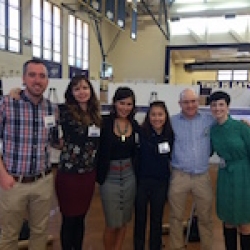
Student Research
Students are encouraged to engage in research by conducting a Master's Thesis or by assisting faculty with research. Student researchers are also supported by faculty advisors to disseminate their work through presentations and publications. The following are a sample of graduate research thesis projects completed by SLHS graduate students:
- Jonathan Robinson Anthony (2016). Speech sound acquisition in a 5-year-old Spanish-English bilingual child. Jonathan was a recipient of the Sally Casanova Pre-Doctoral Scholarship. He has presented at the 2016 CSHA Student Research Forum and the 2016 SF State Graduate Research and Creative Works Showcase. He will be presenting a poster at the 2016 ASHA Convention and has a manuscript in preparation for submission to ASHA Perspectives. Jonathan is continuing his research training in the Ph.D. program in Language and Speech, Language and Hearing Sciences at San Diego State University and the University of California, San Diego.
- Timothy Runyon (2015). Function of laughter from a student with autism. Timothy was the recipent of the 2015 Graduate Student Award for Distinguished Achievement for the Department of Speech, Language and Hearing Sciences. He has presented at the 2015 CSHA Student Research Forum and the 2015 SF State Graduate Research and Creative Works Showcase, 2015 SF State NSSLHA Research Forum.
- Sylvia Soule (2015). Autism, play, and language output. Presented at the 2015 CSHA Student Research Forum and the 2015 SF State Graduate Research and Creative Works Showcase, 2015 SF State NSSLHA Research Forum.
- Stephanie Tran (2015). Heritage language maintenance of a child with autism spectrum disorders: A parent's perspective. Presented at the 2015 SF State Graduate Research and Creative Works Showcase, 2015 SF State NSSLHA Research Forum.
- Stevy Shadwick (2015). The effectiveness of electropalatography as an alternative therapy tool. Presented at the 2015 ASHA Convention, 2015 SF State Graduate Research and Creative Works Showcase, 2015 SF State NSSLHA Research Forum.
- Kiiya Shibata (2015). Navigating identity issues in accent modification: Perspectives from Japanese-accented English speakers. Presented at the 2015 SF State Graduate Research and Creative Works Showcase, 2015 SF State NSSLHA Research Forum.
- Timothy Kahn (2015). The effectiveness of eletropalatography as a clinical therapy tool. Presented at the 2015 ASHA Convention, 2015 SF State Graduate Research and Creative Works Showcase, 2015 SF State NSSLHA Research Forum.
- Wesley Heidenreich (2014). Pragmatic presupposition and its impact on the syntax of an AAC user. Wesley represented SF State at the 2014 California State University Student Research Competition and was awarded second place in the category of Heath, Nutrition and Clinical Sciences (more information in SLHS department Blog). Presented at the 2014 SF State Graduate Research and Creative Works Showcase, 2014 SF State NSSLHA Research Forum. Manuscript in preparation.
- Bronwen Morgan (2014). Looking at games as learning contexts for an adolescent with autism and significant intellectual disability. Presented at the 2014 SF State Graduate Research and Creative Works Showcase, 2014 SF State NSSLHA Research Forum. (more information in SLHS department Blog).
- Audrey Debouverie (2014). Phonologically-based naming treatment in individuals with damage to perisylvian regions in the brain. Presented at the 2014 SF State Graduate Research and Creative Works Showcase, 2014 CSHA Student Research Forum, 2014 SF State NSSLHA Research Forum. (more information in SLHS department Blog).
- Veronica Castillo (2014). Families perspectives on disabilities in rural Guatemala. Presented at the 2014 SF State Graduate Research and Creative Works Showcase, 2014 CSHA Student Research Forum, 2014 SF State NSSLHA Research Forum. (more information in SLHS department Blog).
- Mollie Mindel (2013). Identification and placement of African-American children in special education within the San Francisco Bay Area. Presented at the 2013 ASHA Convention.